[ad_1]
If your jeans fit just a couple of months ago, and you haven’t done anything differently, you’re probably wondering, “why am I gaining weight?”
You’re not alone. Many people who eat healthy foods, stay loyal to their workout routine, and drink plenty of water may all experience sudden weight gain. It may seem like there’s no good reason, but experts tell us there are some common reasons why you’re suddenly gaining weight fast.
While your exercise and diet efforts are still important for you to achieve your weight loss goals, there are a number of factors that can cause you to gain weight that often go unnoticed.
We uncovered some of the top reasons why you’re gaining weight and asked experts how to overcome each, so you can get back to your ideal weight. And while you’re making these healthy changes, be sure to try out any of these 15 Underrated Weight Loss Tips That Actually Work.
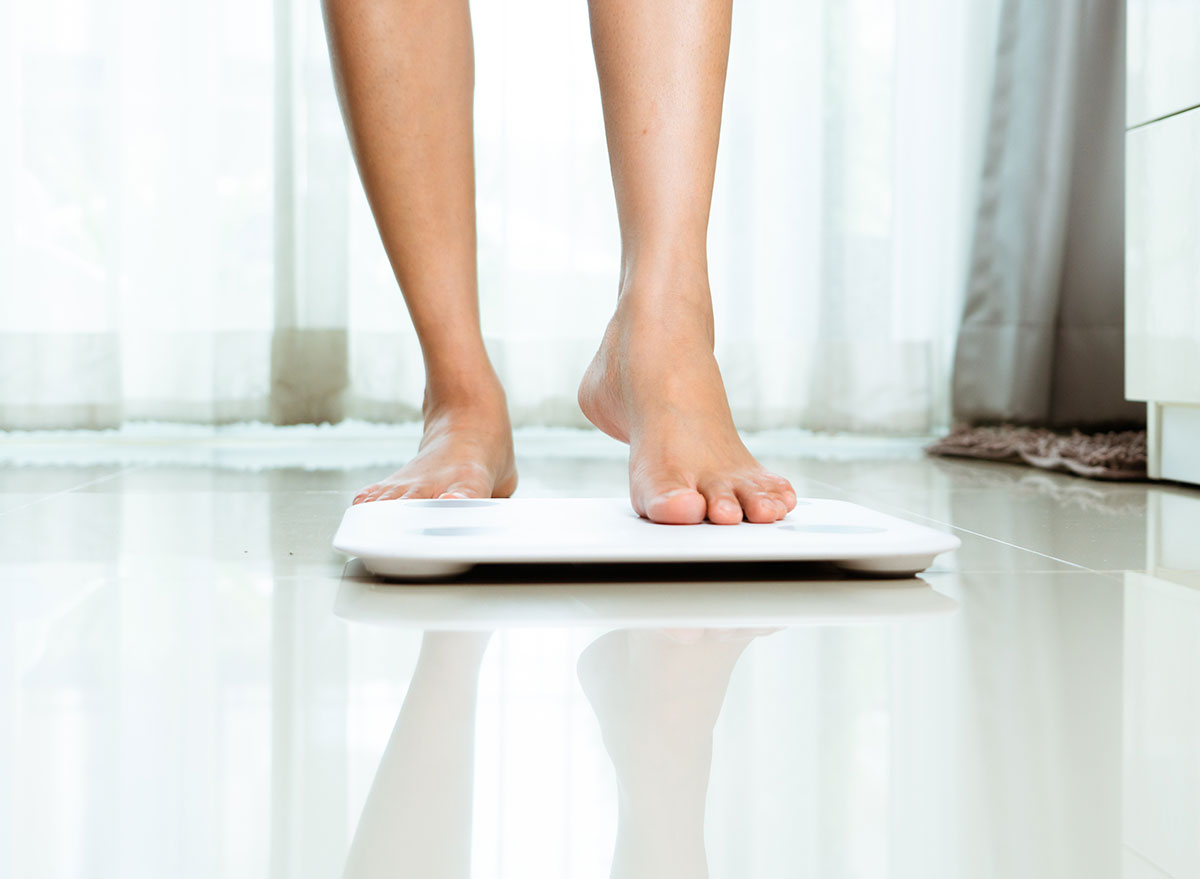
Of all the little white lies, the expression “what you don’t know can’t hurt you” is one of the worst, regarding weight loss. However, when we’re talking about weight gain, ignorance could be the very reason behind your ever-tightening waistband. “When you avoid the scale because you don’t want to know the number, that’s when you get into trouble,” says Christine M. Palumbo, MBA, RDN, FAND, an award-winning Chicago-area registered dietitian and nutrition expert. Rather than hinder your progress, stepping on the scale actually helps you lose weight. According to a study published in the journal Obesity, frequent self-weighing is associated with greater weight loss, less weight regain, and better weight gain prevention.
The solution: Weigh yourself at least once a week—if not two or three—to monitor your progress. “I recommend weighing in on Monday, Wednesday, and Friday,” says Palumbo. “If Monday is a bit higher than usual, all the better for getting back on track for the upcoming week. And Friday is good because if you’re a bit on the high side then, well, it’s all the more incentive to stay-the-course for the weekend and not go too crazy.”
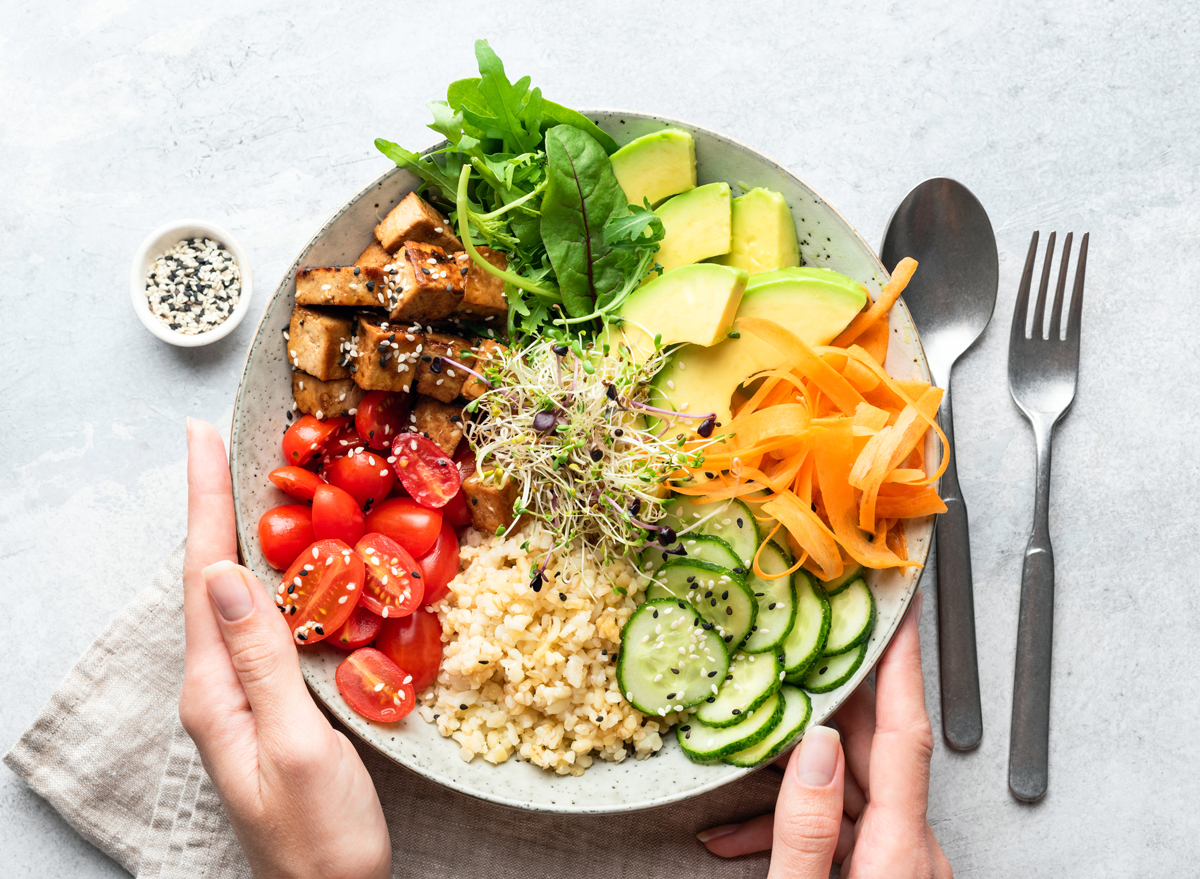
“There is a misconception that if a food is considered ‘healthy’, you can eat as much of it as you want,” says Amy Goodson, MS, RD, CSSD, LD, and author of The Sports Nutrition Playbook. “The reality is that is not true. Foods like avocados, nuts, nut butters, hummus, cauliflower crust pizza, etc. are nutrient-rich for sure, but they still provide calories and thus you have still need to watch your portion sizes. Weight gain occurs when we take in more calories than we need to maintain our weight. Whether those calories come from fast food or nuts, they are still calories. Sure, one is high-quality calories, but still, they must be considered.”
The solution: Portion out your food correctly with these 18 Easy Ways to Control Your Portion Sizes.

“Many people forget their fresh-squeezed juice and caramel macchiato typically provide a good amount of calories without making them feel very full,” says Goodson. “From soda to sweet tea to juice to fancy coffee beverages to alcohol, many individuals drink lots of calories and forget to count them into their total intake. They can especially add up when you are sipping on one of these beverages with a meal instead of as a meal or snack.”
The solution: Instead, rely on one of these 14 Best Drinks to Drive Weight Loss.

“There are two ways that online calorie-tracking applications can be erroneous,” says Theresa Gentile, MS, RDN, owner of Full Plate Nutrition, and the New York City Media Rep for New York State Academy of Nutrition and Dietetics. “Firstly, they use a generic algorithm to calculate the number of calories you need each day to lose a certain amount of weight. This number, although it is a good guesstimate, can’t take into account your personal, underlying metabolic factors (or body composition). The only reliable feedback you’ll have as to whether or not the caloric recommendation is right for you is your weight on the scale.”
“Secondly, calorie-tracking applications often reimburse you each day with the calories that you’ve burned off with exercise. Let’s say your calorie needs are 2,000 calories per day and you’ve burned off 300 with exercise (supposedly, which is another inaccurate calculation). The application then gives you an allowance of 2,300 calories for the day. If you’re trying to lose weight (vs. maintain), you’ll want to create a deficit in daily calories and not eat what you’ve burned off in exercise.”
The solution: Find the proper calorie amount you need to lose weight using our calculator.

“Why am I gaining weight if I’m sticking to my diet religiously?” you may ask. And we have the answer: you’re taking it a little too seriously. You don’t have to restrict yourself completely when you’re trying to lose weight—live a little! It’ll actually help you to reverse recent weight gain. Having a cheat day (or even cheat days) while dieting may actually help aid weight loss, according to an International Journal of Obesity study. Australian researchers found that when participants alternated between adhering to a strict diet for two weeks and following it with two cheat weeks lost more weight during the study than those who stuck to a strict diet the entire time. Bonus: The “cheater” group also gained back less weight after the study finished.
The solution: To get back to a trimmer version of you, eat the real thing, but downsize your portion. If you love ice cream, for example, skip the fro-yo and have a small scoop of premium.

If you’re working out but gaining weight, the problem may lie in the amount of time you’re spending exercising. There’s no denying that working out is an important weight loss factor, but oddly enough, thinking about your upcoming sweat sessions too often can make it more difficult to lose weight. An Obesity Reviews meta-analysis indicates that people tend to overestimate how many calories they burn when they work out—and will end up eating more on days they work out. A separate study supported this finding, showing that people tend to increase their food intake after exercise and end up eating more calories than they burn.
The solution: To prevent sudden weight gain, avoid excessive noshing after exercising. Pick up pre-portioned pre-workout snacks tailored to your fitness routine.

“When you go to the market on an empty stomach, you tend to buy some of the wrong foods—cakes and cookies, and junk food to munch on,” says Lisa Young, PhD, RDN and author of Finally Full, Finally Slim.
The solution: “I suggest eating a snack before heading out and shopping from a list. This way, you’ll remember to add the healthy foods to your shopping cart,” says Young.
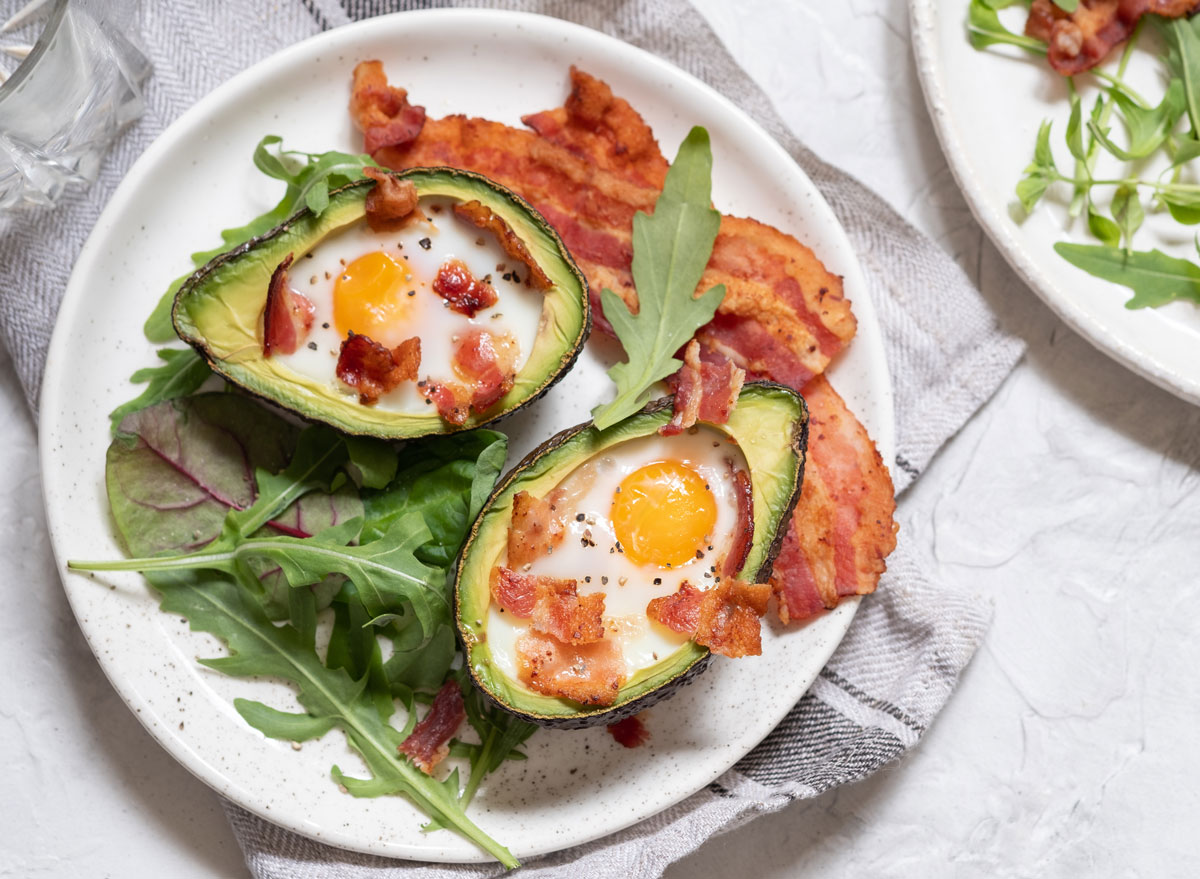
Portion size is just as important as eating healthy. The reason: Many nutritious foods—like avocados, oatmeal, quinoa, dark chocolate, nuts, and nut butters—can lead to weight gain when eaten in excess because they’re calorically dense.
The solution: Unless it’s a fruit or a vegetable, don’t make the assumption that the healthy food you’re eating is low in calories. Next time you’re whipping up a meal, remember these three portion control cues:
- A helping of nut butter or shredded cheese should be no larger than a ping-pong ball
- A true serving of rice and pasta is about the size of your fist
- Lean meats should be about the size of a deck of cards.
Sticking to the recommended serving size can help prevent sudden weight gain.

With each passing birthday after the big 3-0, we start to lose muscle mass. As a result, Biggest Loser dietitian Cheryl Forberg, RD, tells us our metabolism naturally slows. That has got to be the worst birthday present of all time! “When our metabolism slows down, we will gain weight, especially if we continue to eat the same amount of food as we did when we were younger.”
The solution: To keep your lean, youthful figure, Forberg says staying active is a must: “A combination of cardio and weight-bearing exercise will help preserve lean body mass and muscle tissue, keeping the metabolism elevated.”

A University of Birmingham study found that drinking two cups of water before each meal could significantly accelerate weight loss. So it should come as no surprise that not drinking enough H2O can have the opposite effect on your waistline. “Not only does water give us energy and help maintain body temperature, but it also helps us feel more full,” says Forberg. “Not drinking enough water can cause us to eat excess calories that could lead to weight gain. Plus, when you’re dehydrated, the body will conserve water for vital body functions, which can result in water retention and a higher number on the scale.”
The solution: Sip water continuously throughout the day. And remember that water alone isn’t the only way to stay hydrated, there are many water-rich foods you can eat along with other water-rich drinks like coffee, tea, and smoothies.
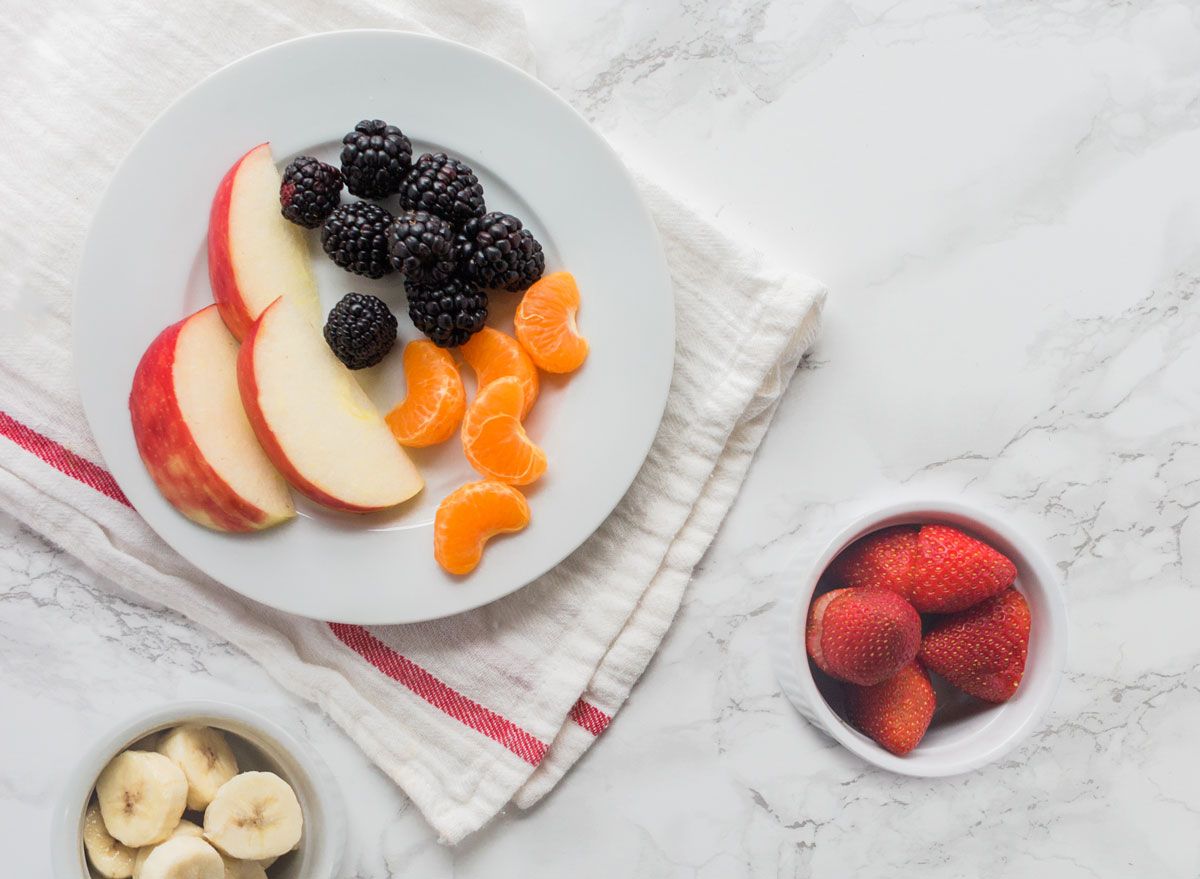
“While you don’t need to eat first thing in the morning if you’re not hungry, if you eat too little during the day, you may end up overeating at night,” says Young. “You didn’t realize how hungry you were, and once you eat dinner, you may end up nibbling nonstop till bedtime. A no-no for your weight loss efforts.”
The solution: Give your body a healthy boost of energy at the start of the day with one of these 91+ Best Healthy Breakfast Recipes.
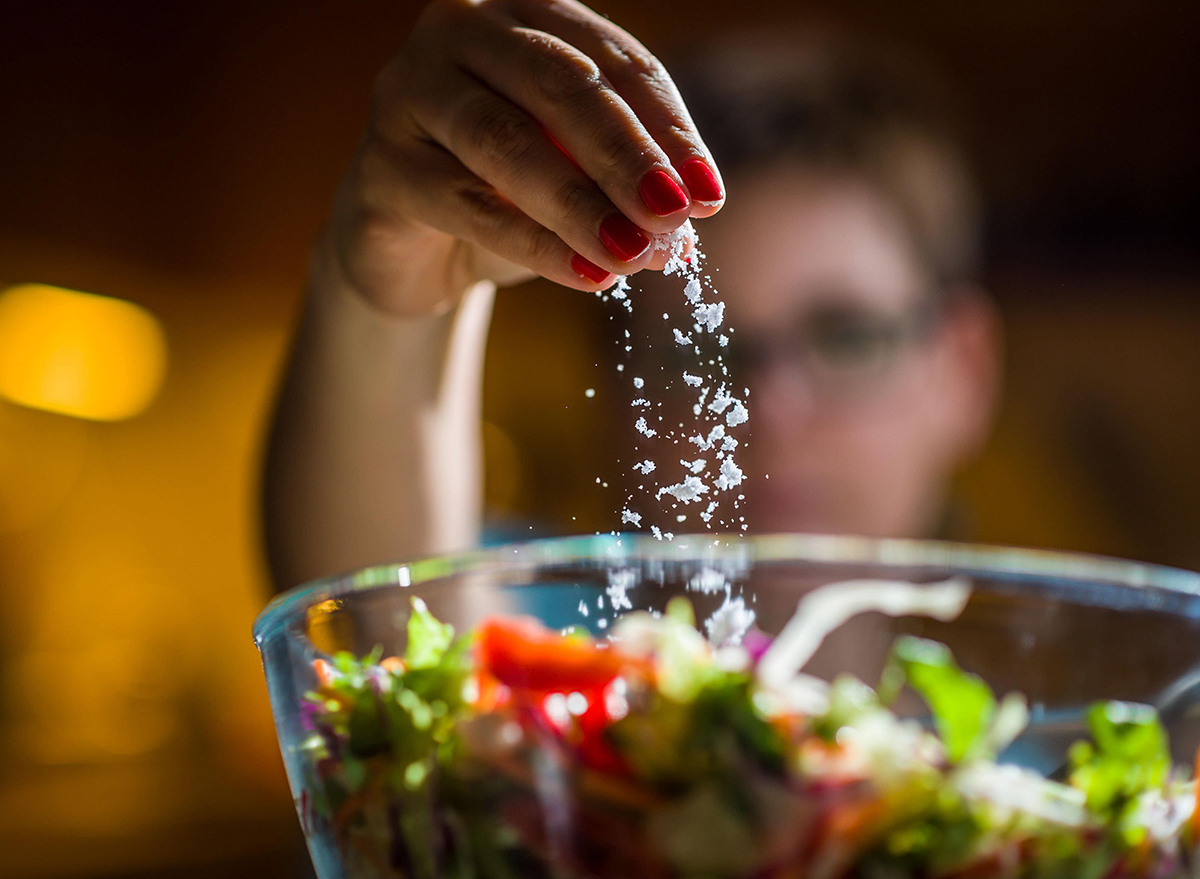
A high-sodium diet can make you retain water and bloat. And when you retain water in your gut, it can make it seem like you’ve experienced a sudden weight gain in your stomach—when it’s just water weight. As Palumbo says, “sodium-related weight gain is easy come, easy go.”
The solution: Up your water intake and cut back on the sodium. Cooking more at home with fresh herbs instead of salt should help your belly deflate in a day or so. Dining out? Scan nutrition info at home before you head out and pick a healthy restaurant dish with about 1,000 milligrams of sodium or less.
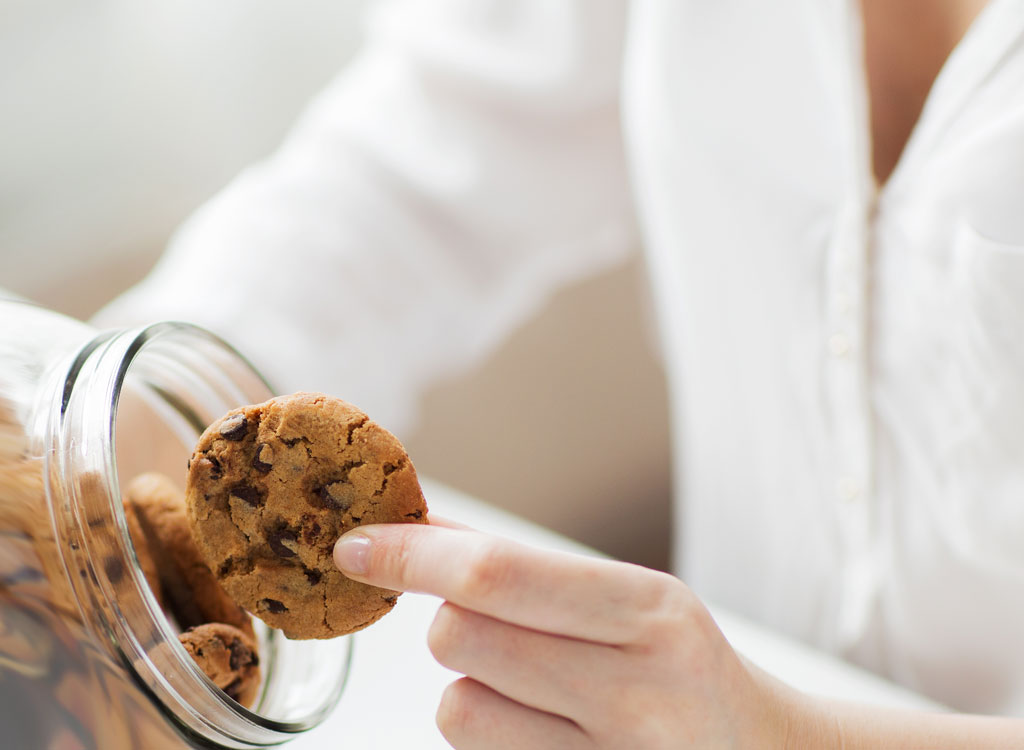
“Whether it’s ice cream, cookies, chips or other items, just knowing that your trigger foods are in the kitchen or your office desk can derail your healthy eating program,” says Palumbo. “This is especially true between 3 p.m. and bedtime when cravings tend the be the most difficult to ignore.”
The solution: One of the best ways to overcome a passing craving is to keep the foods you know you can’t deny out of the house. Can’t imagine kicking your favorite cookies out of the house for good? Individually portion off the foods you tend to overeat. If you know each Ziploc bag of chips is 150 calories, you’ll be less likely to go back for a second serving.

The thyroid, a gland in the neck that sits above the Adam’s apple, regulates a wide range of bodily functions including metabolism. But sometimes, for a variety of reasons, your thyroid may become under-active and result in a condition called hypothyroidism. One of the many symptoms of the condition? You guessed it, weight gain. The worst part is that the condition often develops slowly, so many people don’t notice the symptoms of the disease until they’re full-blown, says The National Institute of Diabetes and Digestive and Kidney Diseases. It gets worse: If a thyroid issue is to blame for your weight gain, it doesn’t matter how diligently your dieting and working out; it will be near impossible to shed the pounds.
The solution: Take a trip to the MD. “If you’ve suddenly put on weight for no apparent reason, I suggest you see a doctor so a medical professional can decide whether it is a thyroid issue or another cause,” Forberg.
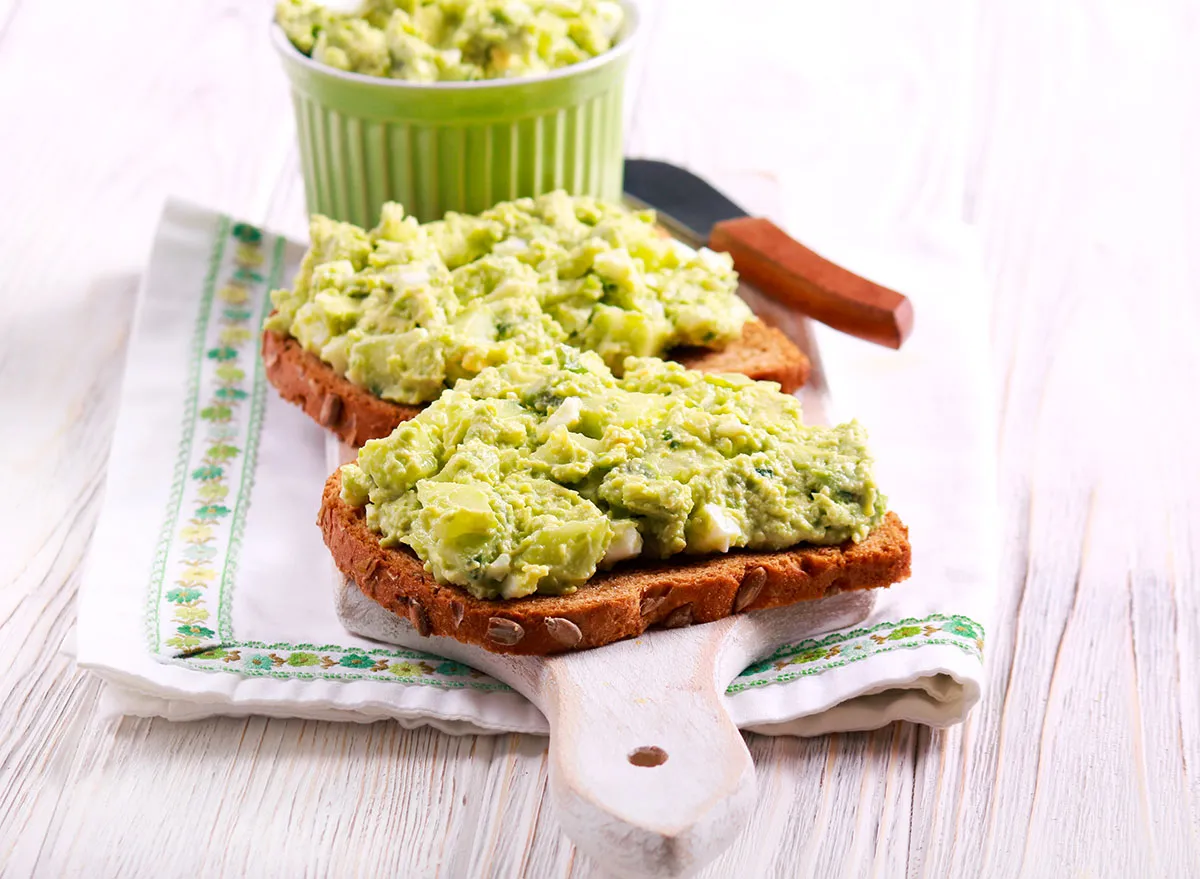
“High-fiber foods are important to keep hunger at bay and maintain a healthy weight,” says Jinan Banna, PhD, RD. “Fiber provides a feeling of fullness, as it slows stomach emptying. It passes through the digestive tract undigested and provides very little in the way of calories. Many foods that contain fiber are naturally very low in calories and high in water, such as most fruits and vegetables.”
The solution: Try to incorporate more of these 43 Best High-Fiber Foods into your diet.

From beta-blockers to birth control pills, and everything in between, there’s a long, long list of medications that can cause your waistline to bulge. And if you think your Rx is to blame for your ever-expanding waistline, you’re not alone. “Weight issues are often a primary reason for non-compliance with treatment,” Palumbo tells us. “Some drugs stimulate the appetite or slow the body’s metabolism. Others cause fluid retention or enough drowsiness to reduce physical activity, which can trigger weight gain.”
The solution: This is important, so listen up: “If you suspect your drug is causing weight gain, never stop taking it. Instead, make an appointment with your healthcare provider and ask if there might be an equally effective alternative that doesn’t affect your weight. Everyone reacts to medications differently, so trying something else may help,” says Palumbo.
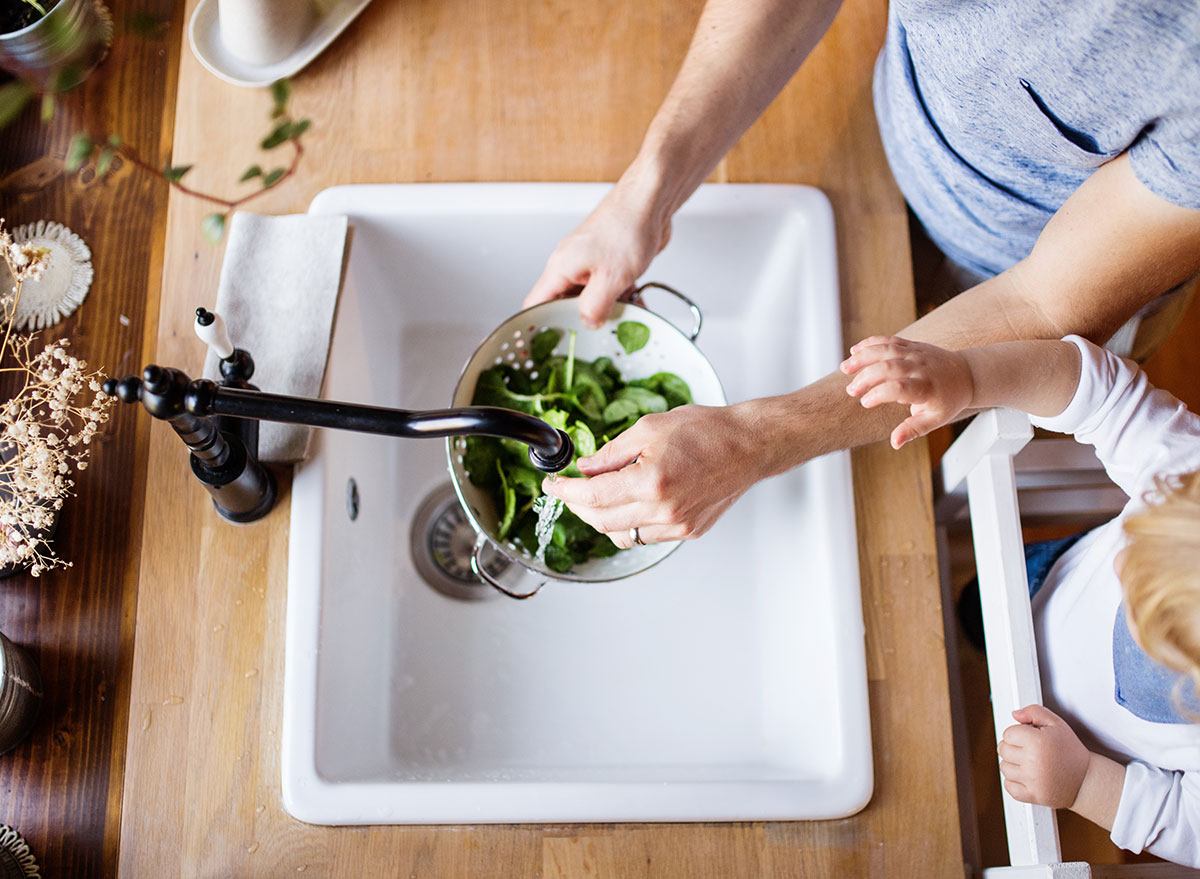
“When my clients feel like they aren’t able to enjoy something indulgent from time to time, it often leaves them with hard-to-ignore cravings,” says registered dietitian Leah Kaufman, MS, RD, CDE.
The solution: “For this reason, I allow my patients to eat 100 discretionary calories each day. It allows them to satisfy their cravings without falling off track.” Nine Peanut M&Ms, 12 gummy bears, and a single Reese’s Peanut Butter Cup all come in right around 100 calories.
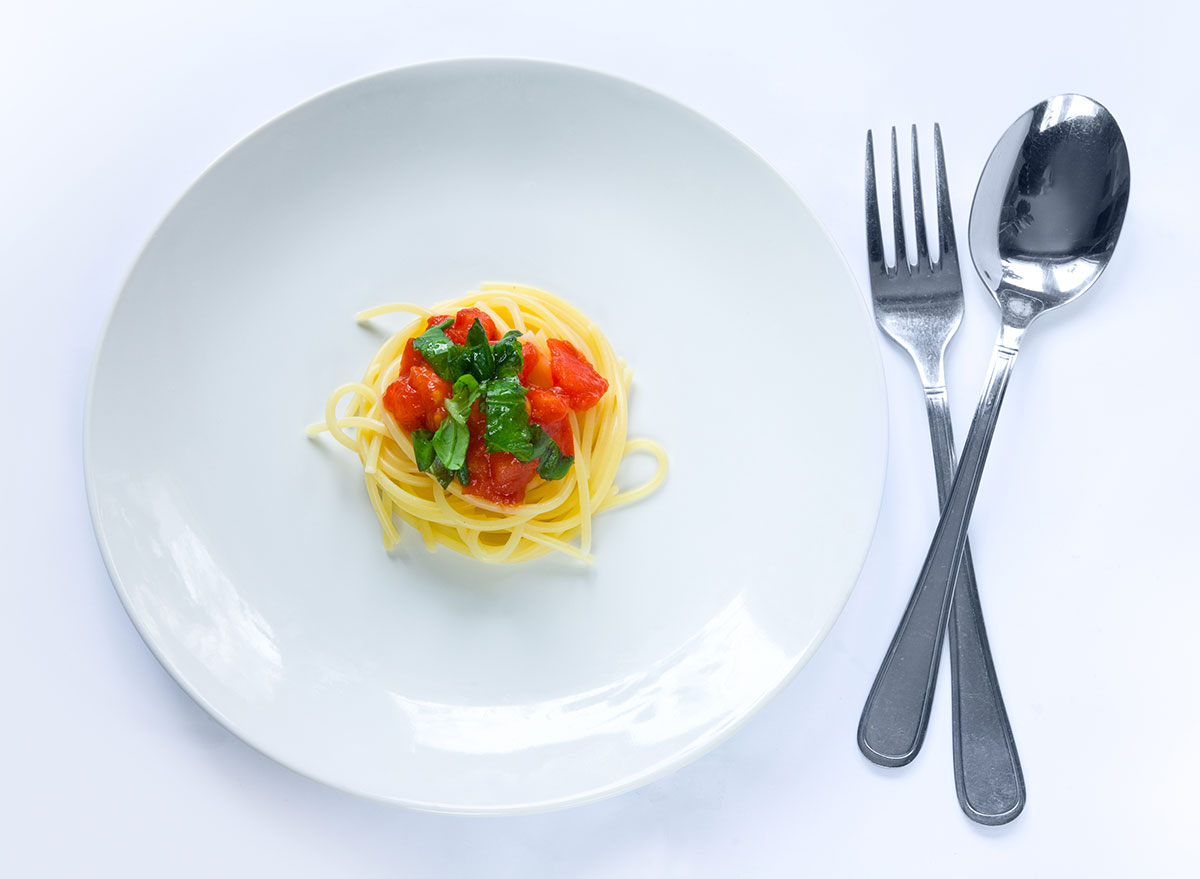
“Every time you eat, insulin is released to help stabilize the sugar being absorbed into your blood,” says Megan Byrd, RD from The Oregon Dietitian. “Insulin is a ‘fat storing’ hormone, so when you eat several times a day, you’re triggering your hormones to store fat more often.”
The solution: “Instead, try to only eat 3 to 4 times per day, and focus on eating lots of complex carbohydrates, protein, fiber, and healthy fats,” says Megan Byrd. “This will help you stay full longer, and prevent weight gain!”

“Often when people are stressed, cortisol levels go up, which can lead to weight gain, as well as make it harder to lose weight,” says Kara Landau, RD and founder of Uplift Food – Good Mood Food. “Although there are various forms of stress management techniques, interestingly, looking after your gut health can be a proactive way you can reduce the inflammation in your body, which can also reduce anxiety and depressive-like symptoms.
The solution: “Nourishing your gut with mood specific probiotics, together with prebiotic-rich foods that feed your good gut bacteria through eating a variety of plant-based foods, as well as specifically prebiotic fiber and resistant starch-rich foods in the form of green banana flour, Jerusalem artichokes, lupini beans (which can be found in delicious Gut Happy Cookies), cashews and overnight oats just to name a few, can be a fantastic way of supporting your mental health, and therefore ultimately supporting your weight too,” says Landau.

“Not paying attention to your hunger can often cause unwanted extra pounds,” says Mackenzie Burgess, RDN and owner of Cheerful Choices. “I like to tell my clients to think about hunger and fullness on a scale of 1-10 with 1 being starving and 10 being extremely stuffed. The goal is to stay somewhere in the middle. When you are first noticing hunger cues such as stomach growling, lacking energy, or feeling irritable–this is probably a sign to eat something. Ignoring this hunger for too long can lead to feeling ravenous later on and may cause you to overeat, leading to weight gain long-term.
The solution: “Instead, try checking in with your hunger and fullness throughout the day–this can help you stay within your body’s daily needs and avoid excess calorie intake,” says Burgess.
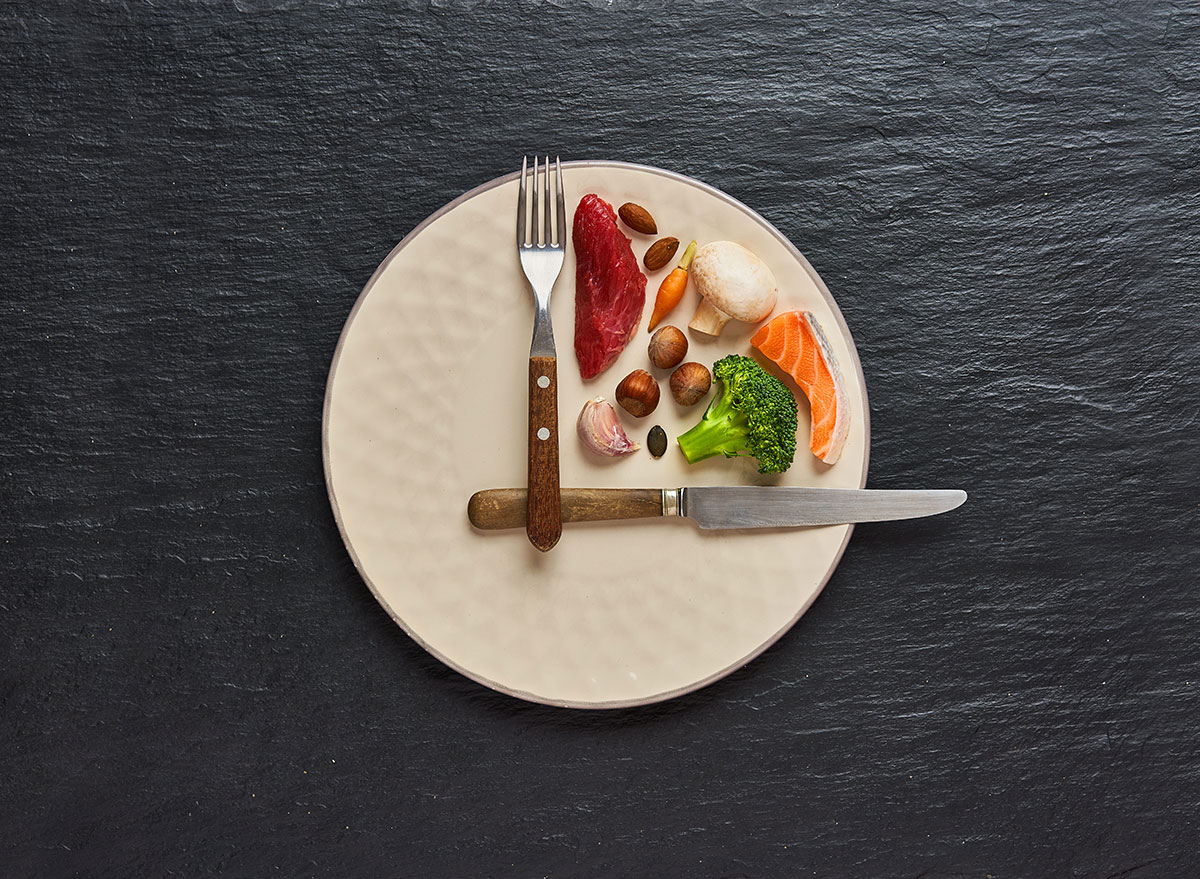
“On a short-term basis, weight loss is possible and relatively easy for some people too. But long term, your body is unlikely to let you get away with this,” says Katherine Kimber, RD. “Within each of our brains lies an incredibly powerful mechanism to control our weight. It’s a somatic body fat control center that works tirelessly to maintain our weight at a level that it decides, known as the set-point weight. It’s governed mostly by your hypothalamus, which sends signals to manipulate your eating, activity, and metabolic efficiency. The setpoint weight can be a range of 10 to 15 pounds, and it’s usually the weight the body likes to go back to in between diets or weight loss attempts.”
“To manage this set point the body responds to an energy deficit by turning on physiological mechanisms, outside of our control to manage weight,” says Kimber. “It might increase hunger signals, make us feel obsessed with food or think about it a lot, make us go crazy around sugar, and crave carbohydrate-based foods. In addition, you may feel less resilient, less energetic than if you were well-nourished, which can affect activity levels and food choices.
The solution: Don’t give in to crazy fad diets and promise to properly feed your body with nutritious foods.
“The body is not designed to be withheld from food, so after a period of famine (dieting/weight loss) it can do everything possible to make us eat and bring our bodies back up to a place where our bodies feel safe,” says Kimber. “So if you’re feeling out of control and are gaining weight rapidly it might just be biology doing its thing!”
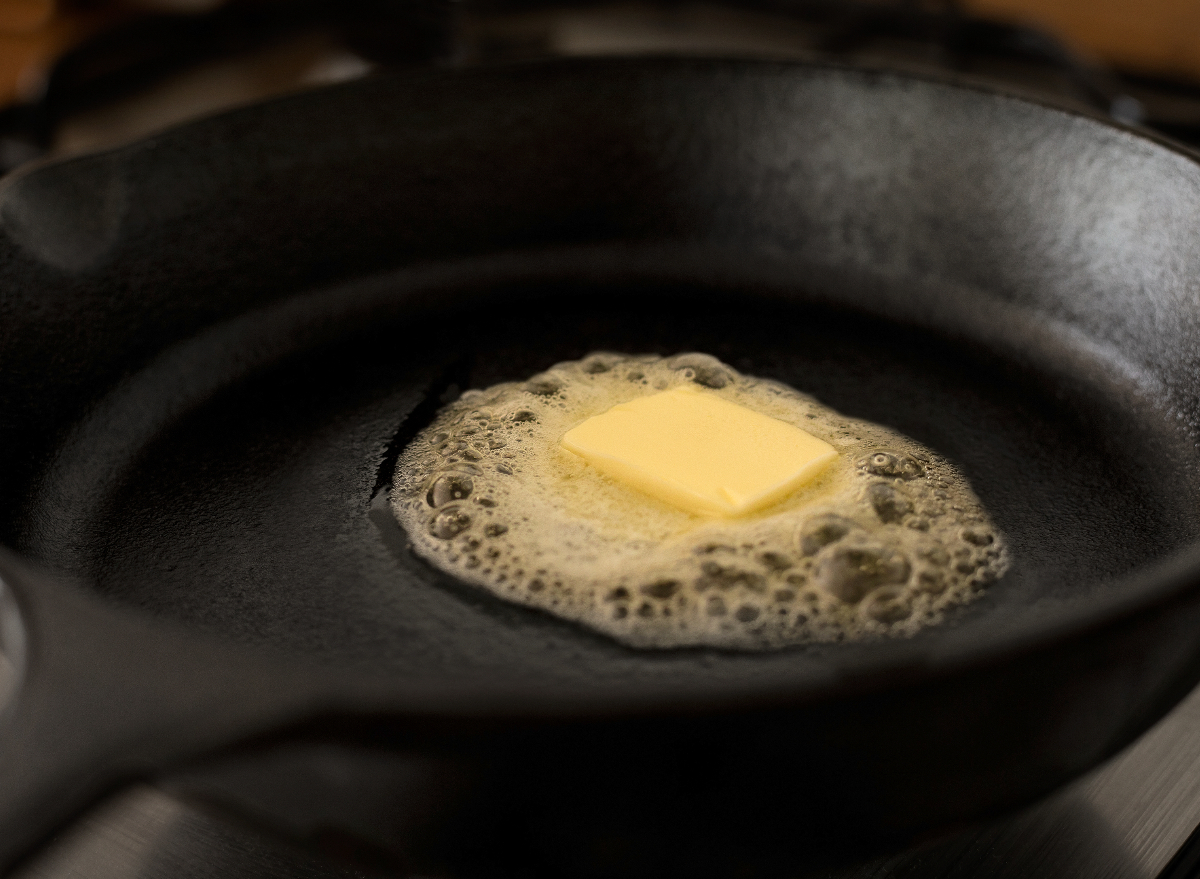
“Cooking with oil or butter are healthy choices,” says Rachel Paul, PhD, RD from CollegeNutritionist.com. “However, since one tablespoon of oil is both over 100 calories, the calories of a meal cooked with oil or butter can increase drastically without one thinking about it.”
The solution: “An easy way to remedy this is to cook with an oil spray,” says Paul. “You still get the same texture and mouthfeel as when you cook with butter, but you can save hundreds of calories.”
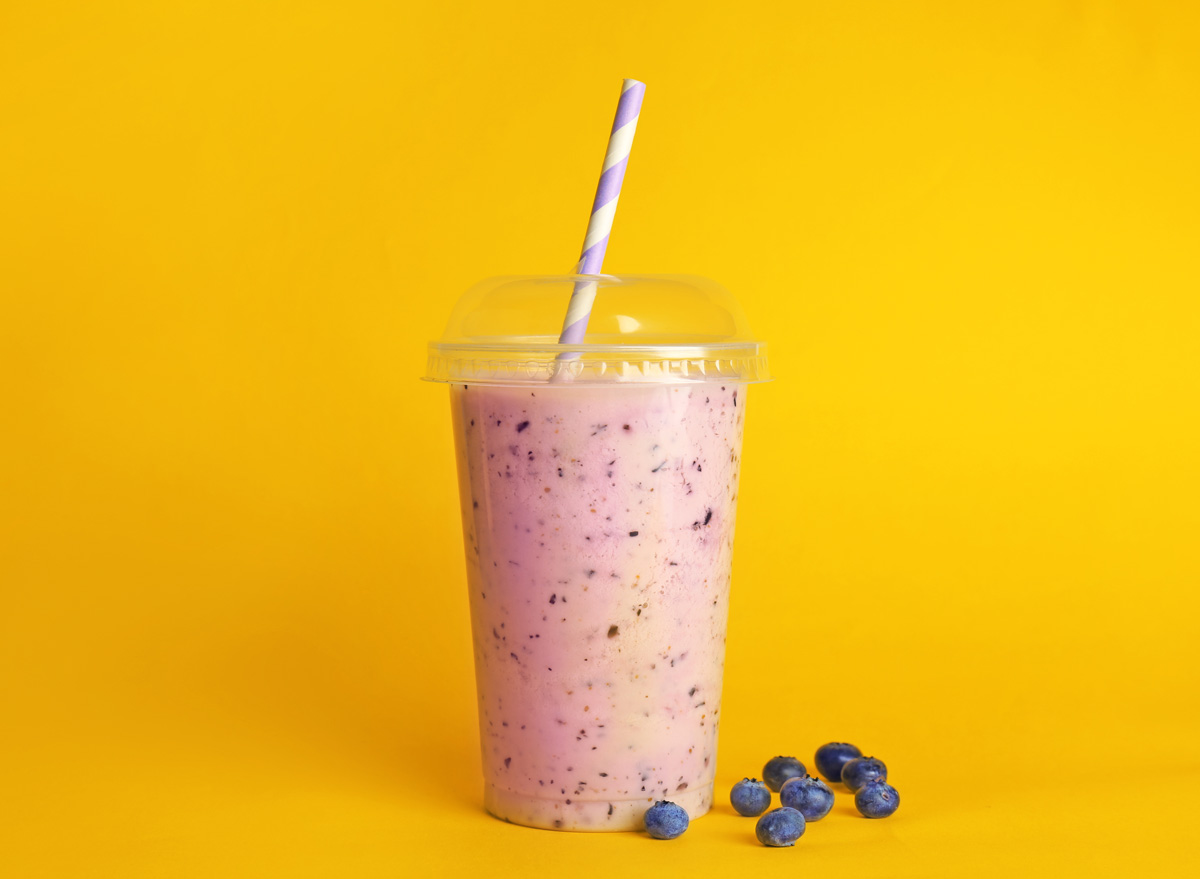
“Drinking smoothies is another trap people can fall into,” says Paul. “When we chew, it takes more time for us to consume the food, and therefore we realize we’re full, quicker. I recommend chewing foods instead of blending them up for weight management.
The solution: “Conversely, when I’m helping someone gain weight, loading up smoothies with fruits, nut butters, etc. is an easy way to pack in hundreds of calories,” says Paul.

Particularly the foods that are marketed to be “healthy,” but aren’t healthy for your body in the slightest.
“Relying on healthy processed foods is one of the worst eating habits that many people follow today,” says Trista Best, MPH, RD, LD, a registered dietitian at Balance One Supplements. “These foods are marketed with health as a major benefit, but do little in terms of boosting health and may even impair most.”
“The issue regarding processed health foods and stalled weight loss is primarily found in those who are attempting to follow a healthy diet that relies on quick meals,” says Best. “When following these diet patterns it is tempting to turn to processed convenience that are unfortunately still high in fat and sugar which simultaneously increases the product’s calories.”
The solution: “Rather than relying on these healthy foods true health and weight loss can be achieved through relying on whole foods,” says Best. “Those with very little processing involved in getting them from the source to your table.”

“I have had many clients tell me they gained weight when changing jobs or retiring,” says Brenda Braslow, MS and Registered Dietitian with MyNetDiary. “If a person goes from an active job to a desk job, the activity level can make a big difference in calorie burn. When a person has an active job, like a mail carrier or construction worker, that person often gains weight after retirement. While they were working, they may have been able to stay slim without exercising outside of work hours. After retirement, they find themselves needing to develop an exercise routine to prevent weight gain.”
The solution: Plan out healthy meals you can rely on during the workweek using our fat-blasting meal plan and get yourself moving with these 25 Easy Exercises That Boost Your Health Fast.

“It takes 20 minutes for the body to register fullness when eating,” says Shannon Henry, RD from EZCare Clinic. “If you’re in a hustle and eating too fast, you’re eating more than you need before your brain sends a message to your body [that you’re full].”
The solution: Give yourself some time after eating a meal to digest, letting the fullness set in so you feel satisfied.
Get even more healthy tips straight to your inbox by signing up for our newsletter!
[ad_2]
Source link
